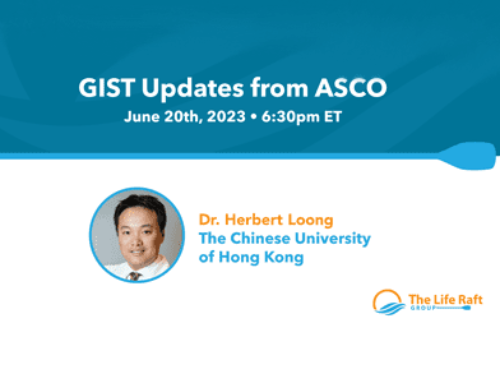 On April 12, the National Cancer Institute (NCI), the American College of Surgeons (ACOSOG) and Novartis pharmaceuticals announced that a phase III trial studying Gleevec use to prevent recurrence in patients whose primary Gastrointestinal Stromal Tumor (GIST) had been removed by surgery would be ended early because it had met its primary endpoint of increasing recurrence free survival with a statistically significant hazard ratio of 3.1. Information on over 600 patients was used in the analysis. In the study, patients were randomized to either Gleevec or a placebo. Neither the patients nor their physicians were told which group they were assigned to. One group received Gleevec at a dose of 400 mg per day for one year, while the second group received placebo for one year (See Note).
On April 12, the National Cancer Institute (NCI), the American College of Surgeons (ACOSOG) and Novartis pharmaceuticals announced that a phase III trial studying Gleevec use to prevent recurrence in patients whose primary Gastrointestinal Stromal Tumor (GIST) had been removed by surgery would be ended early because it had met its primary endpoint of increasing recurrence free survival with a statistically significant hazard ratio of 3.1. Information on over 600 patients was used in the analysis. In the study, patients were randomized to either Gleevec or a placebo. Neither the patients nor their physicians were told which group they were assigned to. One group received Gleevec at a dose of 400 mg per day for one year, while the second group received placebo for one year (See Note).
While it has been known for several years that Gleevec is an effective firstline treatment for GIST, this is the first reported data demonstrating that Gleevec is also effective in preventing GIST recurrence following surgery. Using a drug like Gleevec to try to prevent recurrence is called adjuvant treatment. The interim analysis showed a 97 percent recurrence-free survival rate for the Gleevec group as opposed to an 83 percent survival rate for those on the placebo. While it has been known for several years that Gleevec is an effective first-line treatment for GIST, this is the first reported data demonstrating that Gleevec is also effective in preventing GIST recurrence following surgery. There was no difference in overall survival for patients in the two study groups.
We look forward to seeing the data from this trial analyzing any differences between different subgroups based upon mutational type and between different clinical profiles based upon original tumor size. The latter analysis may provide some guidance for adjuvant treatment based upon the patient’s risk of recurrence, to the extent that is driven by tumor size.
Although the trial protocol also permitted patients whose primary tumor resection did not result in clear margins, we do not know if there were sufficient numbers of such patients enrolled to permit meaningful analysis.
Amongst the critical questions this clinical trial was not designed to answer:
- How long should patients remain on Gleevec on an adjuvant basis? This trial was for one year. We hope that an ongoing Scandinavian study, which is comparing one to three years, will provide more answers.
- Would a dosage higher than 400mg of Gleevec make any difference? As there is no ongoing clinical trial designed to answer this question, we are planning to use the Life Raft Group GIST patient registry to try to find some information on dosage and adjuvant treatment.
- Would Gleevec help to prevent recurrence following surgery for metastatic GIST? Once again, as there is no ongoing clinical trial designed to answer this question, we are going to use the Life Raft Group GIST patient registry to try to shed some light on this question.
Trial investigators are in the process of notifying all the clinical trial patients about these developments. Patients that were receiving a placebo at the time the trial ended will be given the opportunity to receive one year of Gleevec at no cost. It is not clear as we go to press whether placebo patients who completed the one year clinical trial period prior to the end date will also be offered free Gleevec.



